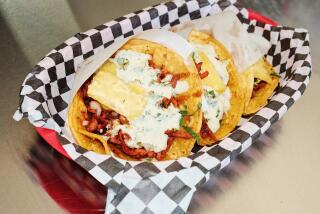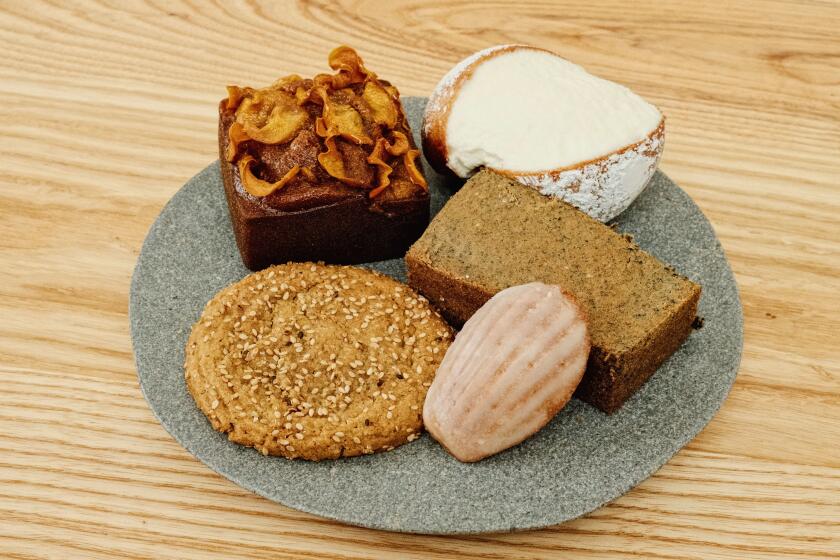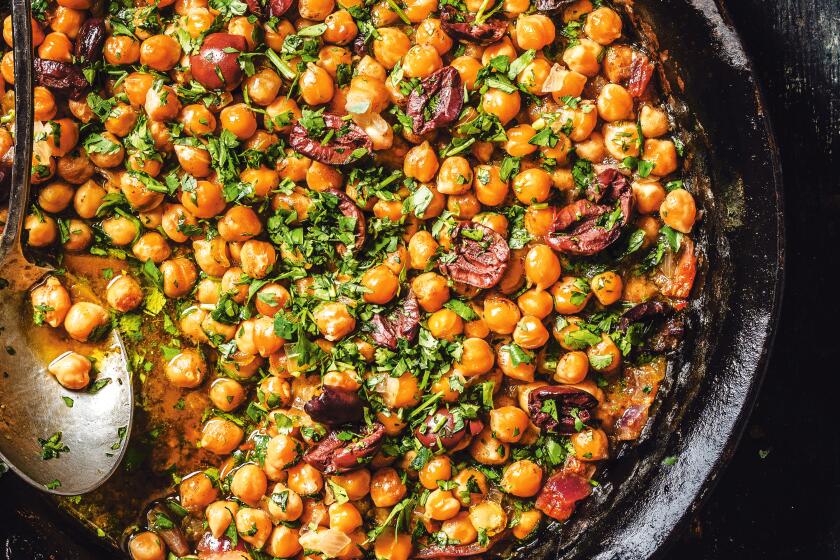Review: This is the L.A. restaurant our critic recommends more than any other
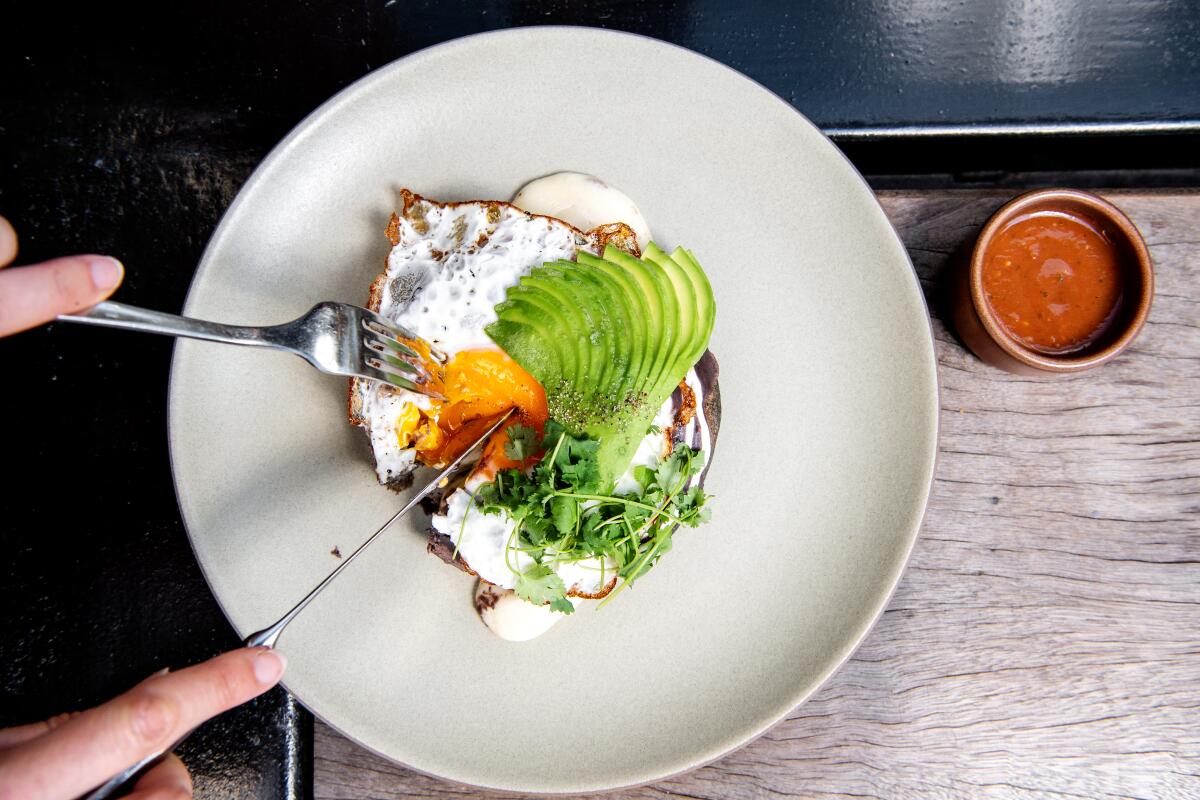
A tall, tiered metal rack stands inconspicuously in the pearly light of République’s castle-like dining room during the day. Rows of peaches — some pale, some blushing, a few so ready to be devoured they’ve turned reddish-gray — line its top shelves. The rack is stationed between an alcove filled with bread ovens and a glassed-in nook where steaks darken as they dry-age, birds hang and cheeses collapse slowly into lusciousness.
Below the peaches are fiery-skinned nectarines and plums colored the faded green of summer grass. A craggy melon lolls on the bottom rung like a full moon low on the horizon.
The fruit sits ripening at room temperature, unbothered by hurrying staff and diners hunting for seats. Would more people consider pawing at the peaches if they knew they were prized, late-summer O’Henrys from Tenerelli Orchards, one of America’s finest growers? The casual display of beauty is a humblebrag, an outright proclamation of the Golden State’s agricultural superiority.
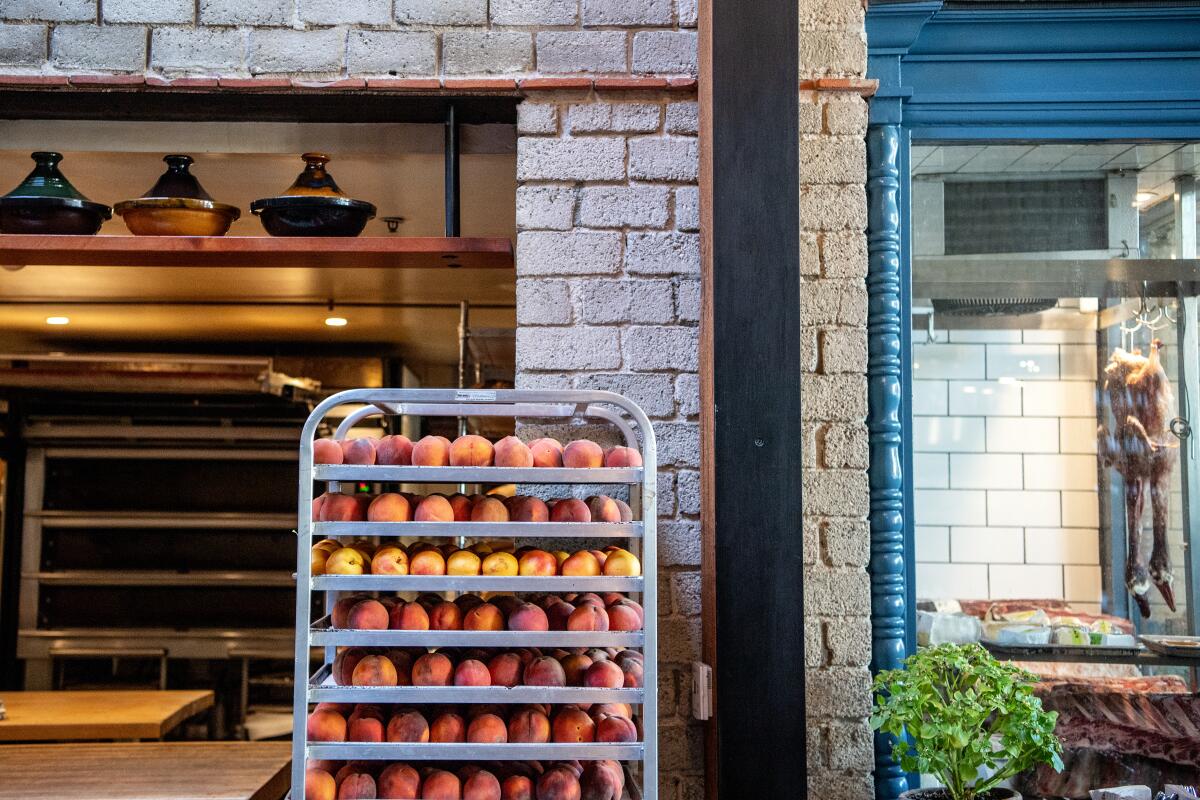
Husband-and-wife chefs Walter and Margarita Manzke flaunt this bounty on their menus from morning to night. Danishes fanned with peaches jump out among the radiant selection of pastries. Melon adds floral musk to a tomato, burrata and basil salad at lunch. Juicy chunks of white nectarine situate a dinnertime appetizer of curried kanpachi crudo in this place, this moment.
Basking in seasonality is the great cliché of California dining, but the Manzkes have forged their own niche in the genre. In 2013, they took over the sprawling, two-story complex on the edge of Hancock Park that formerly housed Campanile and La Brea Bakery, the ventures that crystalized the careers of Nancy Silverton and Mark Peel. Easy stylistic comparisons — meats grilled over woods, Margarita’s jeweled pastries filling a long counter in the same annex where Silverton’s showpieces once tempted — were drawn between the two restaurants in République’s early days.
Six years in, the Manzkes have perfected the template for the all-day modern American restaurant. The place is a perpetual motion machine. The lines trail daily at breakfast; the lunch menu embodies an only-in-Los-Angeles pluralism; dinnertime achieves an elegant, gymnastic leap from casual daytime meals to formal service. It gratifies many palates and persuasions.
I wind up recommending République to friends and readers more than any other restaurant in the city: The restaurant’s totality makes it an unassailable cornerstone of Los Angeles dining.
Pastries
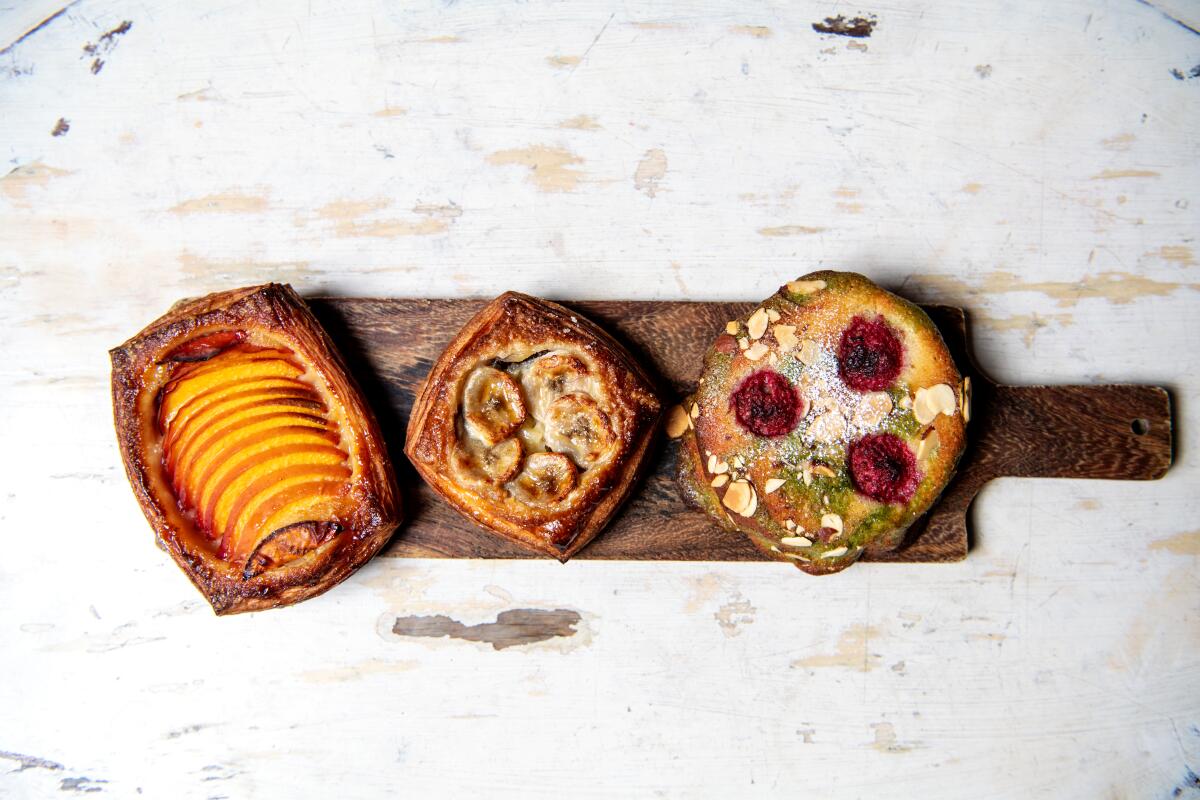
On a recent Saturday at 10:45 a.m., the queue meanders past République’s narrow patio and onto the sidewalk. As many times as I’ve faced this wait, I’ve never before noticed that the planters outside the restaurant are in fact enormous steel bowls made to fit industrial mixers.
I’m inside after 15 minutes, gazing down the sightline of pastries, starting with cream and custard creations (éclairs, rolled mixed berry pavlova, a beautifully wobbly strawberry tres leches) perched on a chilled surface. The crowd inches forward; cakes, cookies, muffins, caneles, crostatas, tarts, brioches, Danishes and doughnuts come into view, crowded on wooden boards or stacked on stands. Croissants — plain (superbly flaky and buttery; a purist’s yardstick), ham and cheese, chocolate, salted caramel — splay out closest to the counter where you order.
A sign by the éclairs reads, “Peach raspberry cream pie,” but its space sits empty. “Any left?” I ask a staffer. She shakes her head.
Not a surprise. Regulars know the short list of extra-prized treats sell out within a couple of hours of the bakery’s 8 a.m. opening, and faster on the weekends. Raspberry-pistachio kouign amann tops the list: It shatters while revealing its sweet, soft heart; a Leonard Cohen song rendered in viennoiserie. Barbecue chicken hand pies, the meat shredded into twangy strands, disappear fast, as do the seasonal fruit pies.
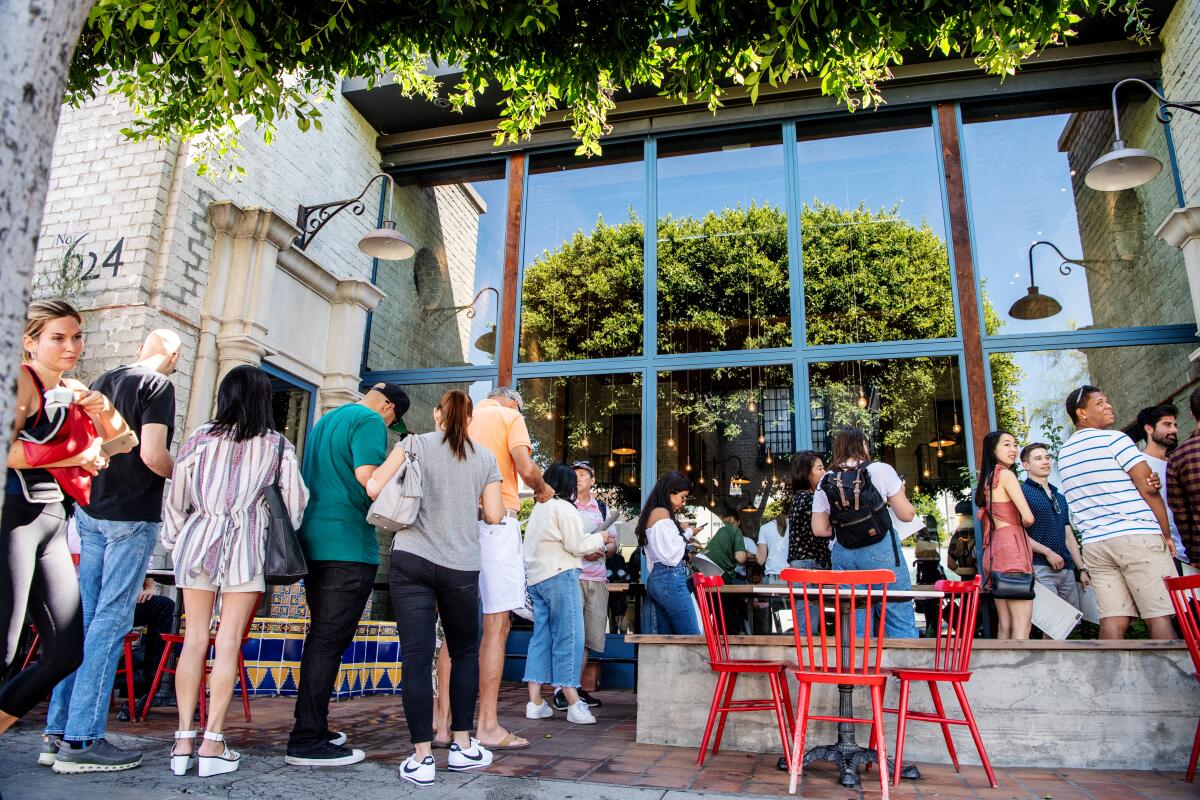
The peach Danish is an exquisite consolation prize, the fruit anchored by a film of almond cream, the dough so finely structured that I can stretch its layers like an accordion. A slice of Basque cheesecake — the dessert du jour in the pastry world, with its purposefully scorched, smoky crown — could be a little silkier in the center. It makes me long for pie.
So I’m back at 8:30 a.m. the next day. Only six people are ahead of me; the pastry case is fully stocked. The cream pie is the ideal summer dessert, a free-form trifle of whipped cream, vanilla custard and fruit tumbled into a pre-baked crust. A second pie of peaches and blackberries with a streusel topping is a true breakfast pie, its sweetness restrained. The staff takes care to warm a chicken hand pie before delivering it; the early September version includes the gentle crunch of fresh corn.
None of Margarita’s pastries is too pretty to eat. They’re meant for unaffected enjoyment. The artistry comes through in the contrast of textures, the tension between sweet and acid, the purposeful, relaxed appeal of the shapes.
In “Baking at République,” which she published in April, Margarita recalls filling pate a choux spheres with pastry cream at her aunt’s catering company in Manila at 7 years old. Throughout her career she’s cooked through every station in a restaurant’s kitchen. But she came back to baking. In the way that Silverton led the charge for a previous generation of pastry chefs, Manzke’s flavor-first philosophy, matched by masterful technique, makes her a leader among peers. If you want to sample the finest collection of pastries in Los Angeles, join the line.
Breakfast, lunch and brunch
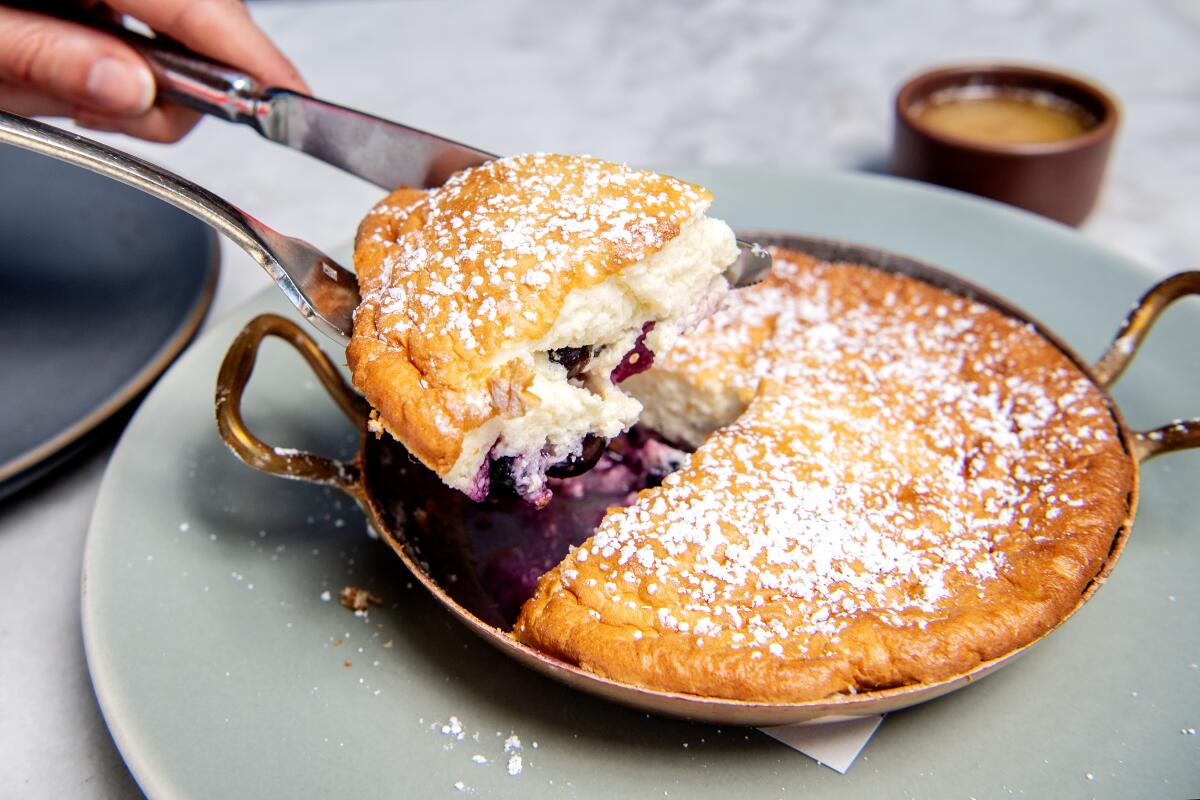
My pastry fanboy self would like to believe that République’s early lines exist entirely for the croissants and pies (and scones and muffins and S’mores bombolonis). Really, though, it’s the universal appeal of superlative pastries with precision-engineered comfort foods that galvanize the crowds.
The sprawling daytime menus feel egalitarian, and maybe that accounts for the clientele: During the day this is frequently one of the city’s more racially and multigenerationally diverse gathering of diners. Fried chicken and waffles or the croque madame, the yolks of its fried eggs just itching to burst, beckon the decadence chasers. Blond omelets will please the classicists. Smoked salmon tartine — layered with Arabic nuances of eggplant labneh, olives, cucumbers and za’atar — or a blue corn pupusa deluged with crema, salsa, avocado, mushroom and fried egg pique food obsessives seeking flavors of the moment. For vegans, there’s a duo dubbed “the California breakfast”: avocado toast with cherry tomatoes and a bowl of chia seed pudding made with almond and coconut milks.
A colleague rightly pointed out that no one République breakfast item is a must-have, Instagram-made-me-do-it destination dish. The mushroom toast probably comes closest, a teetering edifice of scrambled eggs, ham, mushrooms and spinach with Hollandaise and red wine sauces. It’s almost ironic in its richness; it dazzles for three bites but one person might not want to make an entire meal out of it. Kimchi fried rice verges on signature status, with its straightforward but potent whirl of diced short rib, poached eggs and pickled radish.
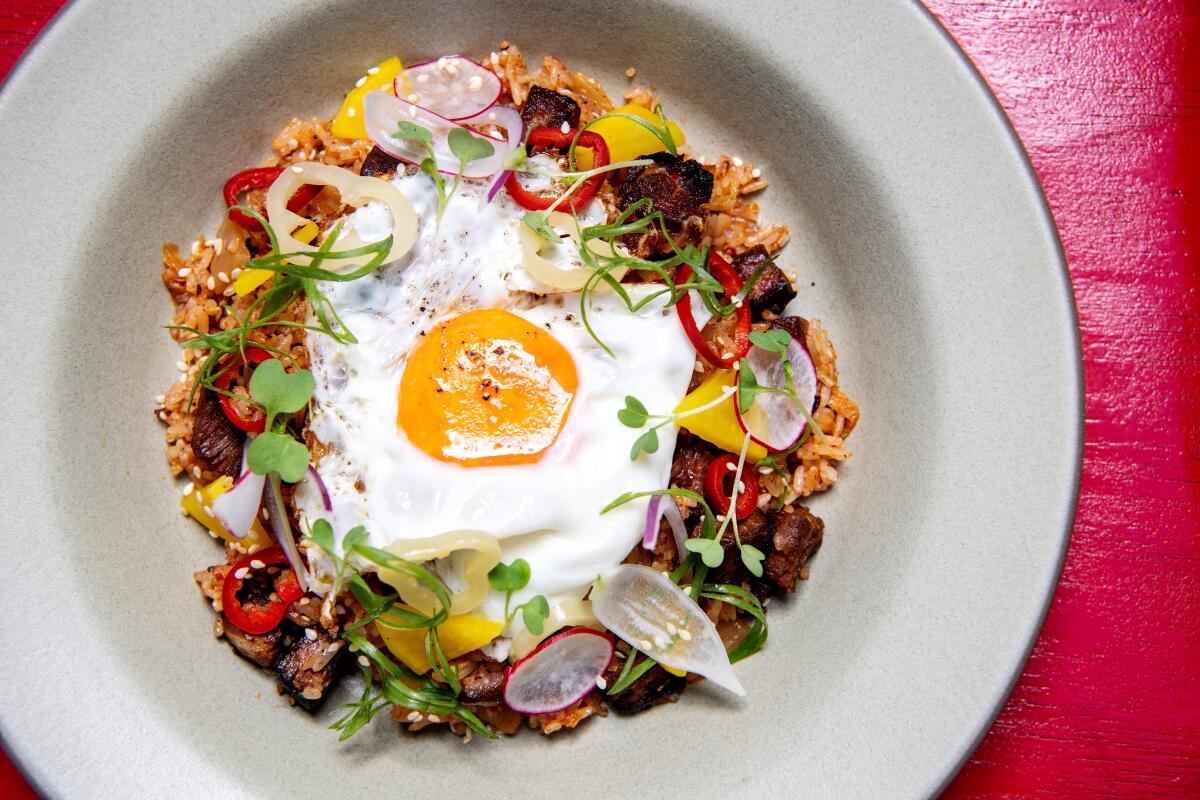
I lean toward the kimchi fried rice and also the “regular breakfast,” an assembly of baguette (Margarita and her team bake excellent crusty bread), butter, bright house-made jam, eggs any style, roasted fingerlings and a thick, sticky slab of bacon. Ask for the eggs soft scrambled and they arrive nearly orange and only just set, which is to say impeccable. For something sweet beyond pastries, I’m keen on her blueberry-studded kaiserschmarrn, a riff on a fluffy Austrian pancake that, in her hands, veers into weightless soufflé territory.
Disappointments are rare. The masa base of chorizo sopes has been gummy more than once; a rotisserie chicken salad, part of the more savory lunch or brunch menu available after 11 a.m., combines little gems, tiny Brussels sprouts, dates, Parmesan and Caesar dressing into a blur that doesn’t quite coalesce. Go, instead, for the cheeseburger made with dry-aged beef or one of the restaurant’s ever-changing pastas — perhaps bucatini cacio e pepe — that prefaces the dinner menu.
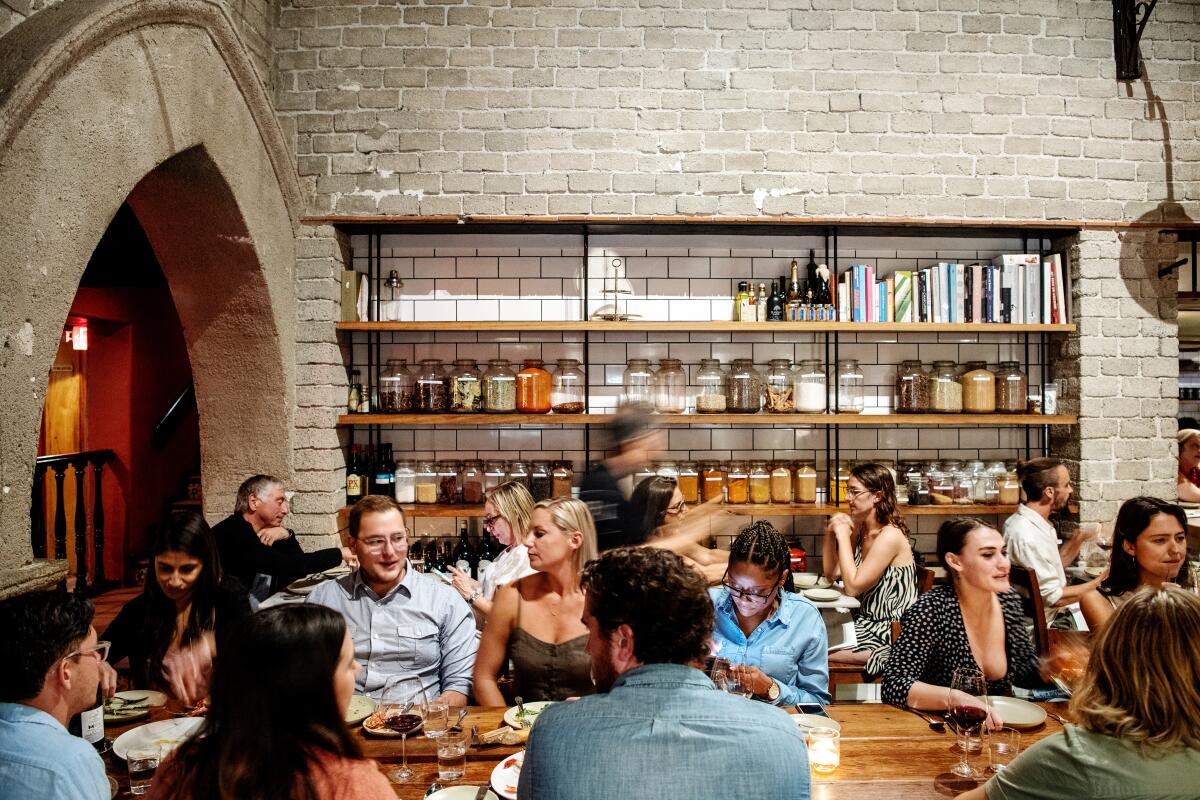
Don’t forget to look up occasionally from your eggs. Daylight favors République’s spectacularly baroque space, built by Charlie Chaplin in 1929 and loosely modeled on the style of the arched, ornamental Spanish Colonial Revival movement favored at the time. Floor tiles that trick the eye (it can look like you’re skipping from one green block to another) offset the imposing concrete-white bricks. Sitting in the center of the atrium dining room, it can feel like you’re breakfasting in a reconstructed “Game of Thrones” set piece. It’s very Los Angeles that way.
Dinner
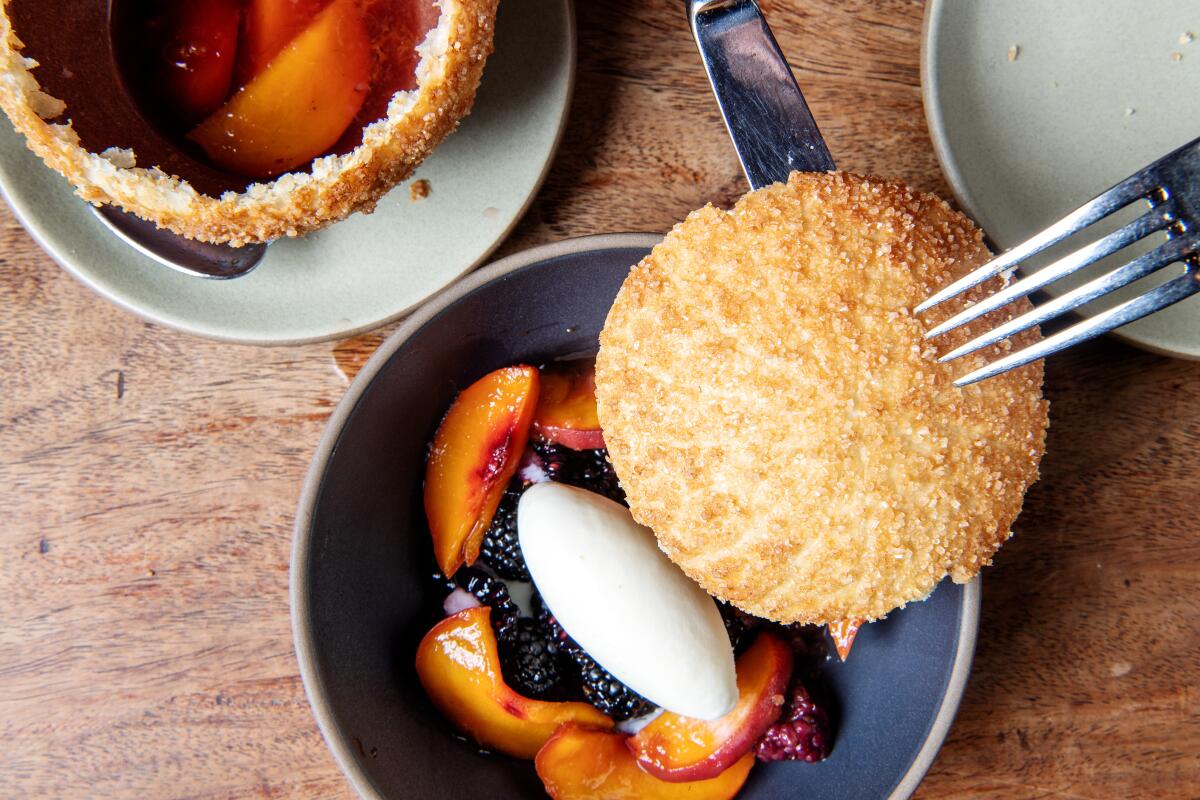
Even as evening falls on République, I still feel pulled to talk sweets — to urge pacing and restraint through dinner, to plan for a dessert of O’Henry peaches baked in their juices with blackberries under a pastry dome, all of which is served tableside from a goblet-shaped dish, arranged around lemon verbena ice cream.
But we must talk about the pan drippings. You should order them, together with butter, as part of the bread service to kick off the meal. Combined they cost $16, which sounds outrageous, but the butter, as nutty as Parmesan and smooth as Camembert, is made by Rodolphe le Meunier, a star cheesemonger in Normandy (where cheese specialists can be celebrities). The pan drippings unite the browned bits left in sauce pots deglazed with chicken stock, combined with meat trimmings and simmered with duck, quail and chicken carcasses. It is hallucinatory Thanksgiving gravy.
A complete meal could be built around them, sitting at the restaurant’s bar, slathering and dunking hunks of baguette, spearing an endive salad and drinking a glass of white Burgundy. But that would mean skipping Santa Barbara spot prawns in ponzu sauce, agnolotti filled with sweet corn and gilded with brown butter, heirloom tomatoes with burrata and watermelon, pepper-crusted duck with tiny turnips and nectarines …
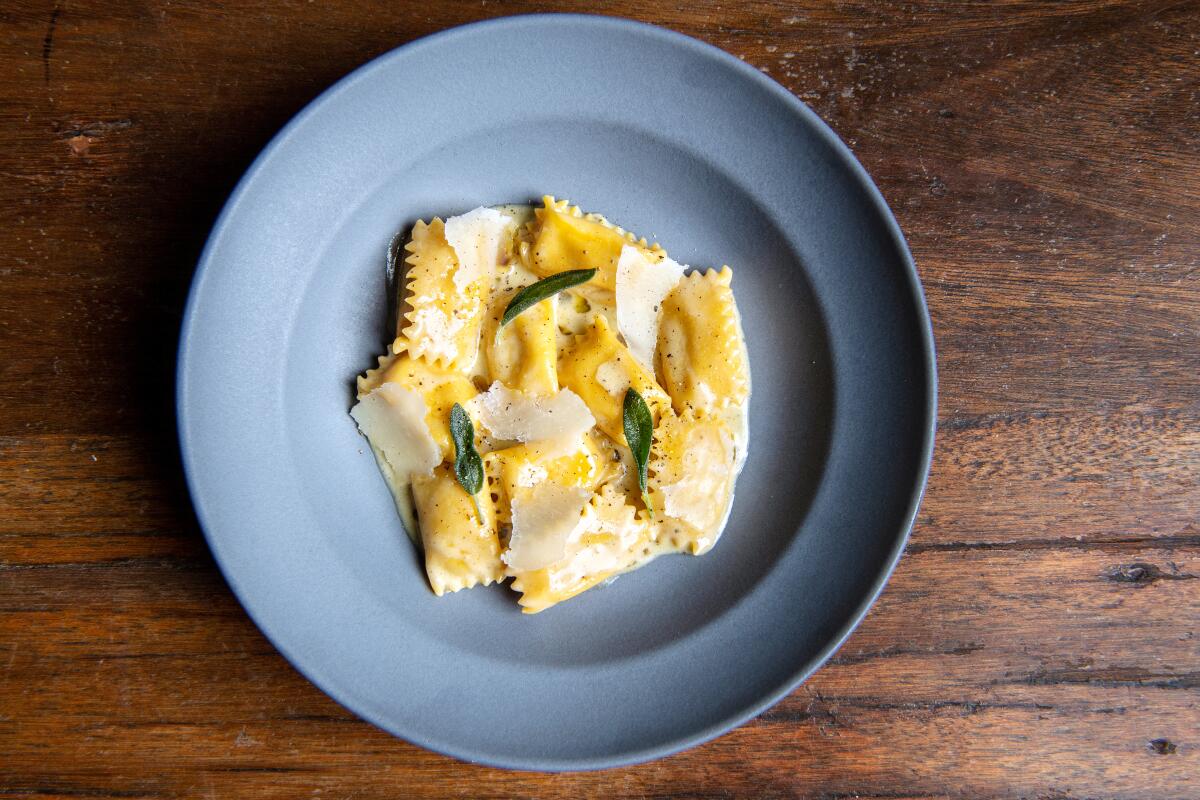
Walter’s experience at restaurants such as Patina, Bastide and, up the coast in Carmel, Bouchée and L’Auberge Carmel grounded him in French cooking traditions. He’s a son of San Diego, and though République is named for a Parisian Métro station, Manzke finds his truest culinary voice in the native California tongue. His cooking does not shatter conventions; he uses exceptional quality and meticulous technique to both comfort and startle.
Concentrate on the fundaments of California cuisine: salads, pastas, heartier meats. The dishes, by whims of harvests and imagination, are forever in flux. Lately clouds of goat cheese have churned underneath figs and endive; a lamb ragu clinging to ridged mafaldine noodles tastes nearly syrupy with tomatoes. A family-style platter of pork — grilled loin, belly and two sausages (including a wonderful, mild blood sausage) — would be special enough, but then quartered, roasted peaches blaze among the meat like poppies in a super-bloom.
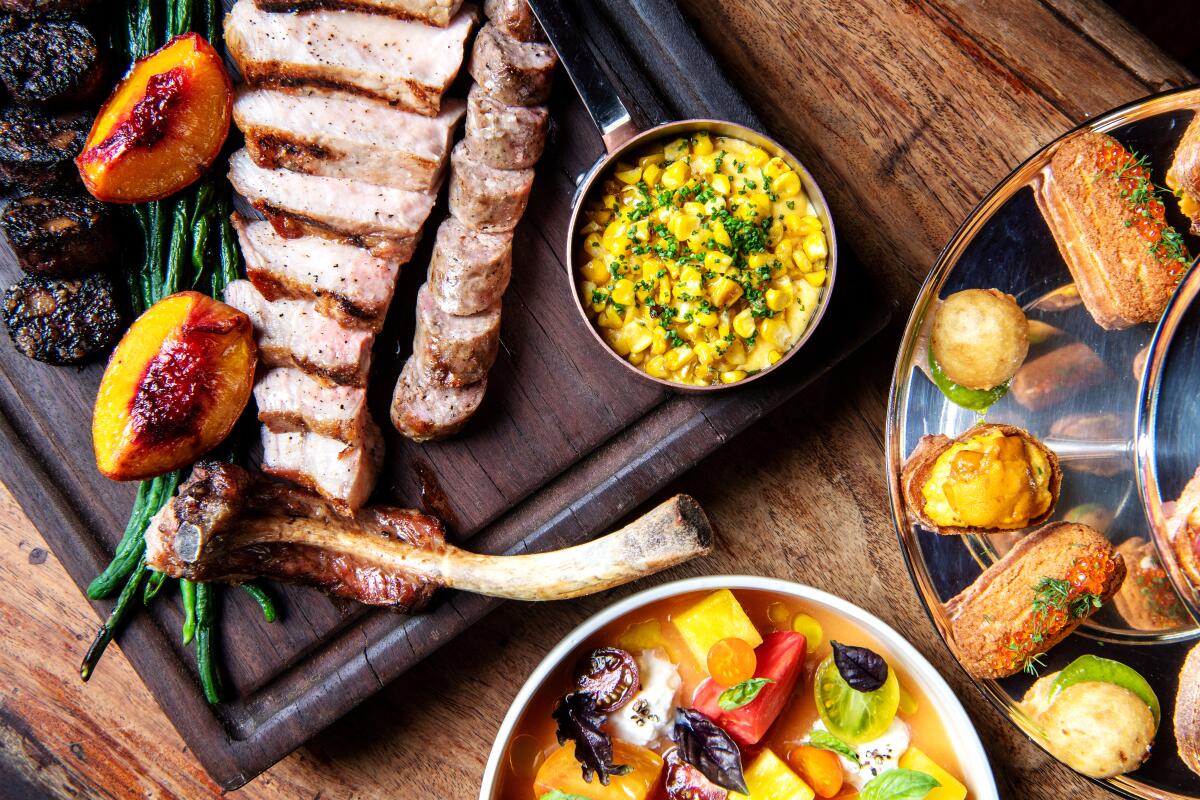
Soon enough the stone fruit will disappear, and the rack parked near the bread ovens will parade fall fruits; before long the menu will list ricotta toast with persimmons, and pork belly with apples, and vanilla bean rice pudding with poached pears.
Race to dinner now for the last of the O’Henrys. You might feel cloistered in the shadowy, timeless back dining room, and a sommelier might have guided you through the restaurant’s encyclopedic wine list to obscure varietals from the Loire or Jura. Eating at République, though, you never forget where you really are.
République
More to Read
Eat your way across L.A.
Get our weekly Tasting Notes newsletter for reviews, news and more.
You may occasionally receive promotional content from the Los Angeles Times.

